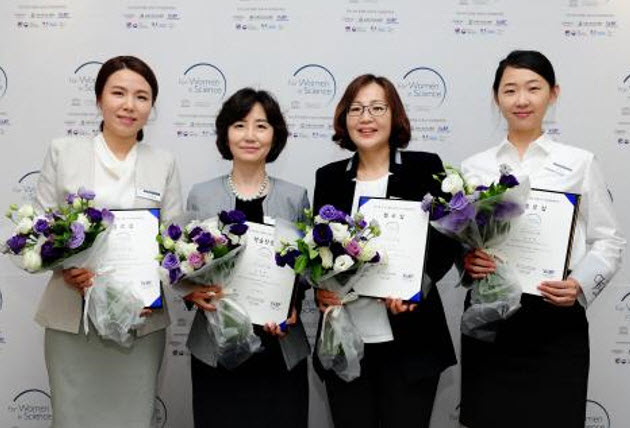
Awardees of 2016 L’Oréal Korea – UNESCO Award for Women in Life Sciences. Professor MOOK Inhee is in the second from left.
L’Oréal Korea and UNESCO presented this year’s Women in Life Science Award in Academic Development to Professor MOOK Inhee (College of Medicine) for her research in a new diagnosis method and treatment for Alzheimer’s disease. The awards ceremony was held at Seoul National University on June 22.
The Academic Development prize, the ceremony’s highest honor, recognized Professor Mook’s efforts in promoting women’s participation in the field of life sciences and the importance of her breakthrough research on Alzheimer’s disease. Professor Mook also received the L’Oréal – UNESCO Korea Prize in Medicine in 2004.
Meanwhile, Assistant Professor KIM Hyun Kyung (Research Institute of Basic Sciences) received the L’Oréal – UNESCO Korea Fellowship Prize, awarded to promising young female researchers, for her research in gene expression, protein activity control and the mechanism behind epigenetics.
The L’Oréal– UNESCO Korea Woman’s Life Sciences Award is presented to female researchers in the field of life sciences who have produced exceptional academic research and is intended to encourage women’s participation in the life sciences. The awards ceremony, hosted by L’Oréal, UNESCO and Women’s Bioscience Forum, has been held since 2002, and there have been a total of 61 recipients.
Professor Mook has been researching Alzheimer’s disease the past 20 years and has published over 135 journal articles as well as 13 patents and four technology transfers. As a graduate of the College of Veterinary Medicine, Professor Mook received her PhD. in the University of Arizona, focusing her studies on neuroscience and synapse formation. Ever since her return from the US, she has been researching Alzheimer’s disease. Professor Mook is best-known for discovering the role of the protein ERK1/2, a cause of Alzheimer’s. The protein controls gamma-secretase, an enzyme that is responsible for producing toxic beta-amyloid, the cause of Alzheimer’s. In 2010, her work in dementia treatment was transferred to Swiss pharmaceutical giant Roche and in 2011 she received the Macrogen Woman Scientist Award. As the country’s leading researcher in dementia and Alzheimer’s, her research efforts have led to significant progress in developing new treatment methods for patients suffering from such diseases.
Written by Yun Hwan Chae, SNU English Editor, yunhwanchae@snu.ac.kr
Reviewed by Professor Travis Smith, Department of Asian Languages and Civilizations, tlsmith@snu.ac.kr

